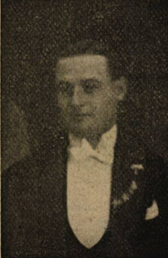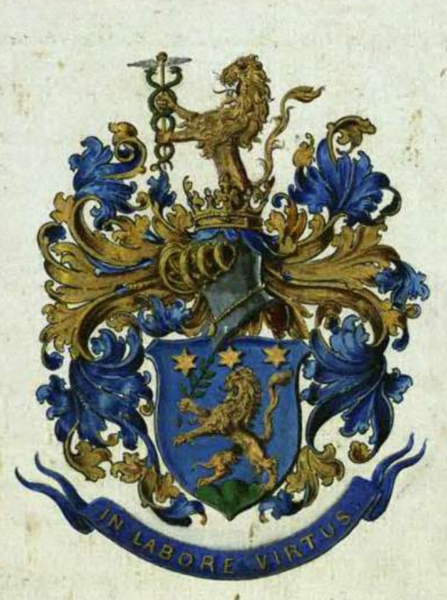Baron György Ullmann of Baranyavár

György Ullmann was a descendant of the Jewish Ullmann family from Baranyavár. The first steps towards the family's economic position were taken by the "founder" of the Baranyavár branch, György Ullmann Mór, who was granted a noble title in 1889. His grandson (through Adolf) Ullmann György was born in 1891. After graduating from the Piarist grammar school, he became a student at the Budapest Academy of Commerce.
He joined the Hitelbank on 15 January 1913. In 1918 he was appointed manager, then director in 1920. Through his father Adolf Ullmann of Baranyavár, he was made a Hungarian baron in 1918 by one of the last acts of King Charles IV.
In 1924, he became Managing Director of the Hitelbank, a post he held until 1945 (when he was appointed CEO), and a member of the Board of Directors from 1927. In 1939, together with the Credit Bank, he held senior positions in 32 industrial companies and financial institutions. He was a member of the board of directors of, among others, Ganz & Tárársa Electricity, Machinery, Wagon and Shipbuilding Corporation, Hungarian Steelworks Corporation, Hungarian General Machine Works Corporation, etc. He was also a director of Hermes Hungarian General Exchange, Agricultural Industry Corporation and Cotton Industry Corporation, and Schlick-Nicholson Machinery, Wagon and Shipbuilding Corporation. In addition, he was Vice Chairman of Hungária United Steam Mill.
He was also active in public life. He was the first president of the Hungarian Table Tennis Association, founded in 1924, and a member of the board of directors of the Hungarian Economic Society from 1925. He was a committed supporter of the Hungarian Social Democratic Party until the end of his life and was also an active art collector. The discovery of his collection of more than 400 items, which he had hidden before his emigration in 1948, was a major sensation in the press.
Despite his Jewish origins, he managed to keep his position until 19 March 1944. But after the German invasion, he was forced to go into hiding. From March 1945 he was a member of the National Economic Council.
György Ullmann held the post of CEO of Hitelbank until the end of 1947, leaving Hungary in 1948. He died in Cologne on 21 March 1961. The Hungarian press also reported that he had met with an accident while skiing.

Sources
Sára Hungler:The evolution of worker participation in Hungary between 1944 and 1949. Our Past (58) 4. 41-62.
Béla Kempelen 1937: Jewish and Jewish-origin families in Hungary 1. Budapest. 96.
Tamás Kovács - Levente Kovács:Bank CEOs who made the Hungarian General Credit Bank great, Economy and Finance, 2017/3.
György Kövér 1993: Diary entries of Baron György Ullmann (Debrecen, 27 February-1 April 1945). Reality (36) 7. 61-87.
Press material 1913-1961.
István Vida 1977: Three Chorin Letters 362/II. Századok (111) 2. 362-380.
Born: 1891.
Place of birth:
Date of death: 12 March 1961.
Place of death: Cologne (Germany)
Occupation: bank president, chief financial officer
Parents: baron Adolf Ullmann of Baranyavár, Ella Lichtenberg
Spouses: Erzsébet Oetl-Pálffy
Children: György Ullmann, Erzsébet Ullmann, Péter Ullmann
Author: Róbert Szabó
Born: 1891.
Place of birth:
Date of death: 12 March 1961.
Place of death: Cologne (Germany)
Occupation: bank president, chief financial officer
Parents: baron Adolf Ullmann of Baranyavár, Ella Lichtenberg
Spouses: Erzsébet Oetl-Pálffy
Children: György Ullmann, Erzsébet Ullmann, Péter Ullmann
Author: Róbert Szabó
Baron György Ullmann of Baranyavár

György Ullmann was a descendant of the Jewish Ullmann family from Baranyavár. The first steps towards the family's economic position were taken by the "founder" of the Baranyavár branch, György Ullmann Mór, who was granted a noble title in 1889. His grandson (through Adolf) Ullmann György was born in 1891. After graduating from the Piarist grammar school, he became a student at the Budapest Academy of Commerce.
He joined the Hitelbank on 15 January 1913. In 1918 he was appointed manager, then director in 1920. Through his father Adolf Ullmann of Baranyavár, he was made a Hungarian baron in 1918 by one of the last acts of King Charles IV.
In 1924, he became Managing Director of the Hitelbank, a post he held until 1945 (when he was appointed CEO), and a member of the Board of Directors from 1927. In 1939, together with the Credit Bank, he held senior positions in 32 industrial companies and financial institutions. He was a member of the board of directors of, among others, Ganz & Tárársa Electricity, Machinery, Wagon and Shipbuilding Corporation, Hungarian Steelworks Corporation, Hungarian General Machine Works Corporation, etc. He was also a director of Hermes Hungarian General Exchange, Agricultural Industry Corporation and Cotton Industry Corporation, and Schlick-Nicholson Machinery, Wagon and Shipbuilding Corporation. In addition, he was Vice Chairman of Hungária United Steam Mill.
He was also active in public life. He was the first president of the Hungarian Table Tennis Association, founded in 1924, and a member of the board of directors of the Hungarian Economic Society from 1925. He was a committed supporter of the Hungarian Social Democratic Party until the end of his life and was also an active art collector. The discovery of his collection of more than 400 items, which he had hidden before his emigration in 1948, was a major sensation in the press.
Despite his Jewish origins, he managed to keep his position until 19 March 1944. But after the German invasion, he was forced to go into hiding. From March 1945 he was a member of the National Economic Council.
György Ullmann held the post of CEO of Hitelbank until the end of 1947, leaving Hungary in 1948. He died in Cologne on 21 March 1961. The Hungarian press also reported that he had met with an accident while skiing.

Sources
Sára Hungler:The evolution of worker participation in Hungary between 1944 and 1949. Our Past (58) 4. 41-62.
Béla Kempelen 1937: Jewish and Jewish-origin families in Hungary 1. Budapest. 96.
Tamás Kovács - Levente Kovács:Bank CEOs who made the Hungarian General Credit Bank great, Economy and Finance, 2017/3.
György Kövér 1993: Diary entries of Baron György Ullmann (Debrecen, 27 February-1 April 1945). Reality (36) 7. 61-87.
Press material 1913-1961.
István Vida 1977: Three Chorin Letters 362/II. Századok (111) 2. 362-380.